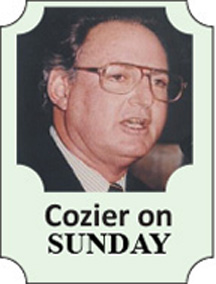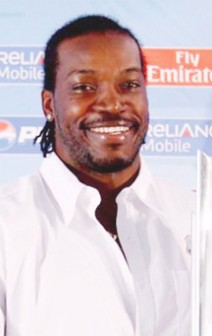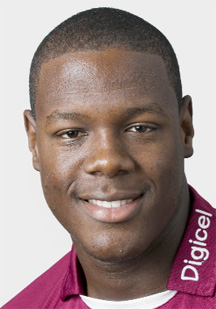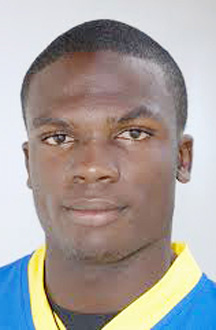Unless the quote was lost in translation in the Reuters transmission from Dhaka, neither the question at the media briefing on the West Indies’ team arrival in Bangladesh or Ottis Gibson’s answer was surprising.
As Chris Gayle kept belting the white ball into the night sky for his Royal Challengers’ team across the border in the Indian Premier League (IPL), Reuters reported the inevitable question and the inevitable reply.
 It read: “Asked if he thought the absence of Chris Gayle would hurt the team in the series starting next week, head coach Gibson emphatically said: ‘No’, We are not going to miss him because he’s not here.”
It read: “Asked if he thought the absence of Chris Gayle would hurt the team in the series starting next week, head coach Gibson emphatically said: ‘No’, We are not going to miss him because he’s not here.”
Gibson once again stated that his purpose was to build a team around young players along with “senior players that are committed to mix with the youngsters and guide the youngsters.”
Gayle was passed over for the home series against Pakistan and India earlier in the year and signed up when an opening came up for the Royal Challengers Bangalore.
Adamant that he wants to play for the West Indies, even without a central contract, he has had meetings with WICB representatives and chief executive Ernest Hilaire to sort the matter out, CARICOM has also gotten involved.
The problem has now dragged on for several months without resolution. Based on a WICB announcement of the team for Bangladesh, it finally appears to be coming to an end.

“The WICB management will submit a report to the board of directors after which a conclusive statement will be made,” it declared.
The decision is likely to correspond with Gibson’s position that “we need some senior guys with the hunger and desire,” leaving Gayle to pursue the several lucrative Twenty20 tournaments that have already made him the wealthiest West Indian cricketer.
His future will be known when the WICB board of directors meets in a few weeks.
As much as the coach is convinced of the eventual success of his policy, the decision is not up to him. It is the reason why his comment in Dhaka was both untimely and unrealistic.
Given the WICB’s assurance that it would issue “a conclusive statement” after receiving the team management’s report, Gibson’s reply to the media query should have been a straightforward:“The issue of Gayle’s absence will soon be determined by the board.” Full stop.
On purely cricketing grounds, as one of the game’s most devastating and experienced batsmen, Gayle (91 Tests, 3,373 runs, 13 hundreds, 228 ODIs, 8.027 runs, 19 hundreds) will clearly be missed in a team whose openers (Adrian Barath, Keiran Powell and Kraigg Brathwaite) have six Tests between them.

If such stats were the only criterion for selection, the powerful Jamaican left-hander would be a certainty but the other factors have so far excluded him.
High on the list is the bitter fallout between himself and Gibson. Its origins go back to the aftermath of the World Cup in April.
Gibson’s criticism of the “senior batsmen” and his assertion that “we need some senior guys who have the hunger and desire” was followed by Gayle’s biting retort in a radio interview that Gibson was “a user” who “messed up the man (Ramnaresh Sarwan) mentally.”
Contending that no manager in any sport could put up with such public denigration, Gibson demanded an apology, Gayle bluntly refused to give one. He signed for the Royal Challengers instead,
It was a case of an irresistible force confronting an immovable object.
Whatever the WICB board decides, the story has taken a new twist with Gayle’s appointment as Jamaica captain for the imminent Regional Super50 Tournament. While he is committed to the Sydney franchise in Australia’s Big Bash, rather than the simultaneous regional T20, his participation in the Super50 makes him eligible for the West Indies ODI team (next series against Australia at home March-April).

It all depends on the WICB’s “conclusive” judgement and, for all his staggering T20 six-hitting, that is unlikely to be in his favour,
With typical negligence, the West Indies Cricket Board (WICB) has backed itself into a corner over the dispute between Barbados and the Combined Campuses and Colleges (CCC).
It should never have come to that.
From the start, the WICB’s stated policy was that the established regional teams (Barbados, Guyana, Jamaica, Leeward Islands, Trinidad and Tobago, Windward Islands) would have first choice in selection of players over the ill-defined CCC.
Now both Barbados and the CCC have chosen all-rounder Carlos Brathwaite and left-hand batsman Jonathan Carter in their squads for the imminent Regional Super50 competition. The two young players have been placed in an invidious position and, through no fault of their own, have become the focus of media comment.
Asserting that it has become “a matter of grave concern”, the BCA has “called on the WICB to assert its own policy” on the selection of Brathwaite and Carter. Even by WICB standards, it’s an absurd situation.
Not that it shouldn’t have seen it coming.
According to its tribute to Miles Bascombe, Nkruma Bonner and Brathwaite for their recent inclusion in the West Indies team, the weekly UWI Notebook claimed in these pages last week that the CCC is “a development project devised by leading tertiary level educators and designed to reinvigorate the region’s declining cricketing fortunes.”
That Floyd Reifer (now aged 38) should have been in the team since its inception– and still is – in preference to younger, talented players refutes such an assertion.
There are other issues that prompted Joel Garner, the BCA president as well as chairman of the WICB cricket committee, to observe that the WICB needs to have “a serious look” at the role played by the University of the West Indies (UWI) and the CCC.
Not before time, it will discussed at the WICB’s meeting in a few weeks time. Given the WICB’s track record, nothing much can be expected out of that meeting.









